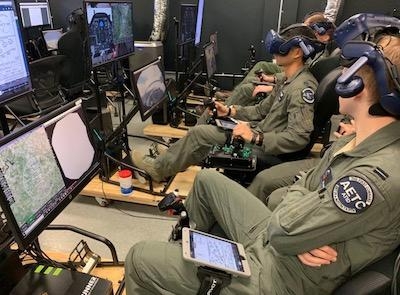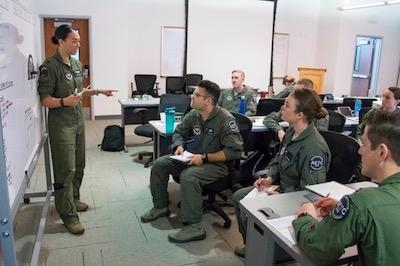Part Of Air Education And Training Command’s Initiative To 'Reimagine' How Learning Is Delivered To Airmen
Pilot Training Next begins its third iteration January 2020, but before moving forward, Detachment 24 officials are looking back at lessons learned from PTN version two.

The PTN program is part of Air Education and Training Command’s initiative to “reimagine” how learning is delivered to Airmen. “As we innovate, we must take stock in the lessons we’ve learned through our first two classes,” said Lt. Col. Ryan Riley, Detachment 24 commander. “We are finding ways to transform the way we learn in pilot training, and doing so, we are defining our challenges, finding our successes and identifying our failures, so we continue to evolve our training.”
The second iteration of PTN capitalized on lessons learned from the first class by integrating new and emerging technologies as well as more individualized access to learning. “Our second class demonstrated the value of emerging technology like artificial intelligence for pilot training and PTN version three will build upon its success,” Riley said.
PTN version two began Jan. 17, 2019, with 10 active duty Air Force officers, two Air National Guard officers, two U.S. Navy officers, one Royal Air Force officer and five active duty enlisted Airmen.
Throughout the class, several encouraging “lessons learned” emerged, including the importance of students’ early access to immersive training devices.

Prior to the class start date, PTN offered an ITD-only distance-learning program to students at the U.S. Air Force Academy in Colorado Springs, Colorado. Those students interested in joining PTN had full access to relevant learning materials and AI-supported training. PTN officials selected four of the eight students to join version two and officials found upon the students’ arrival to PTN, the students possessed a much greater working knowledge of ITD functionality, T-6 Texan basic contact and T-6 basic instruments. Two of the early access students were also the first to complete every milestone for the flying training. “There is no doubt that there is great benefit in the use of ITDs in training,” said Lt. Col. Robert Knapp, Detachment 24 operations officer. “We noticed that students with early access had a rapid ability to ingest data and perform, meaning they can perform faster and improve quicker.”
In addition to early access, another key lesson learned was the value of students’ access to ITDs 24-hours-a-day, seven days-a-week, in their living quarters. While the access was invaluable, the home ITDs were underutilized because of the students’ lack of time due to their on-duty training schedules. “Unlike traditional undergraduate pilot training, which can take up to a full year to complete, PTN students only have six to eight months to learn the content,” Knapp said. “This leaves little downtime, so we will need to re-evaluate the need for in-home devices. Ultimately, we want to make sure we don’t lose the vital element of 24/7 access.”
Another lesson learned was that while PTN’s curriculum is executed in a student-centric learning style, the need for instructor development is critical. “The instructor pilot role here is more important now than ever,” Riley said. “The individualized approach to training can expedite the learning timeline, and it also creates unique scheduling challenges that our instructor pilots will need to address.”
In addition to training provided by IPs, students also took advantage of an AI instructor tool known as VIPER, which played a vital element for the individualized and continuously accessible training environment. “PTN provides an individualized training approach driven by student preference to accelerate learning,” Riley said. “We are graduating students based on competencies--not time. Technologies like VIPER (virtual instructor pilot), immersive training devices and innovative students and instructor pilots are making it possible.”
(Images provided with USAF news release)
 ANN's Daily Aero-Term (05.05.24): Omnidirectional Approach Lighting System
ANN's Daily Aero-Term (05.05.24): Omnidirectional Approach Lighting System Aero-News: Quote of the Day (05.05.24)
Aero-News: Quote of the Day (05.05.24) Airborne 05.06.24: Gone West-Dick Rutan, ICON BK Update, SpaceX EVA Suit
Airborne 05.06.24: Gone West-Dick Rutan, ICON BK Update, SpaceX EVA Suit Airborne 05.03.24: Advanced Powerplant Solutions, PRA Runway Woes, Drone Racing
Airborne 05.03.24: Advanced Powerplant Solutions, PRA Runway Woes, Drone Racing Aero-News: Quote of the Day (05.06xx.24)
Aero-News: Quote of the Day (05.06xx.24)




